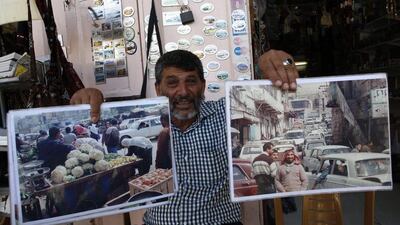In the summer of 1958, a group of eight Syrian children were splashing about in Buhayrat Tabariya, also known as lake Tiberias, near Al Kursi area of the Golan Heights.
Then a restricted area for the Syrian military, it was a popular getaway for the families of officers who would come from across Syria and stay at the nearby Quneitra town in the south-western part of the country.
The tranquil gathering of parents and children where the parents were picnicking in the area, was interrupted with the arrival of an Israeli military boat. One of the uniformed men aboard the boat spoke on a hand-held loudspeaker announcing in Arabic: “Leave the lake now. Go inside. Firing will start.”
The children got out of the lake and ran towards a cave nearby to hide with their parents as sounds of firing echoed from across rocky terrain.
Since the 1948 war, the first Palestine and Arab-Israeli war, in which Israel occupied Palestine, there have been regular exchanges of fire between the Israeli and Syrian armies.
It seemed as if this kind of skirmishes were going to last forever – until 1967.
On June 5, 1967, one of those children, who by then was a teenager, remembered the mood on the streets and how the lead up to the war was charged with pan Arab rhetoric of how Arabs will win back what was taken and they will be united.
“In the morning, the news was all about how the Israeli air force was destroyed and Egyptian president Gamal Abdul Nasser was saying his army shot down hundreds of Israeli planes,” he recalled.
By end of the day, the real news started to trickle in, with reports that the Israelis attacked first, destroyed the Egyptian air force, bombed the airports and that they were moving to destroy Jordan and Syria.
For the past 50 years, historians and experts have debated what really happened and why, with each side telling a different version.
Even today, a search for the real story yields only the winner’s version; that’s because history is written by those who won.
In six days, Israel captured the Sinai Peninsula and the Gaza Strip from Egypt, the Golan Heights from Syria and the West Bank and East Jerusalem from Jordan.
What is important to remember is the human story, that the war resulted in more than 250,000 Palestinians becoming refugees (to add to more than 700,000 Palestinian refugees from the 1948 Nakba) apart from more than 100,000 Syrians who also became refugees as they were expelled from villages and towns in Golan. Some remained in the now Israeli-occupied parts, such as the Druze, but most civilians lost their land and homes.
“Just like the refugees today, refugees then were not treated well,” said the man, who watched the streets of Damascus packed with hungry and weary refugees. He also saw the defeated and exhausted army men walking away from the lost territories.
There was great human misery and suffering, a recurring theme in the region.
However, as in every war, there were some heroes. Tel Fakkhar, a fortress and a Syrian military outpost, which even the Israelis admitted in their reports, was the site of one of the fiercest battles in 1967.
Israeli men who fell there have been commemorated through a memorial. However, you would find the names of the fallen Syrian soldiers and officers only in some old Arabic reports here and there. There is hardly any proper list of names.
While renamed Tel Faher now if you check, the Syrian story goes that while the battalion there did get an order to retreat, dozens of men disobeyed and stood their ground. They kept shooting at the Israeli army, and if one Syrian fell, another came forward and kept shooting. They fell one by one.
Occupied places have been renamed, some turned into settlements and others into ski resorts and parks, but for Arabs even after 50 or 100 years, they remain Arab land.
Over the past 15 years as a journalist, I have met hundreds of Arab families who were victims of these wars.
Many of them told me tales of losses, of broken families and crushed spirits. Many would pull out a “key”, a key passed down in the family to a home they will probably never be able to go back to, if it is even still standing.
rghazal@thenational.ae
Twitter:@Arabianmau

